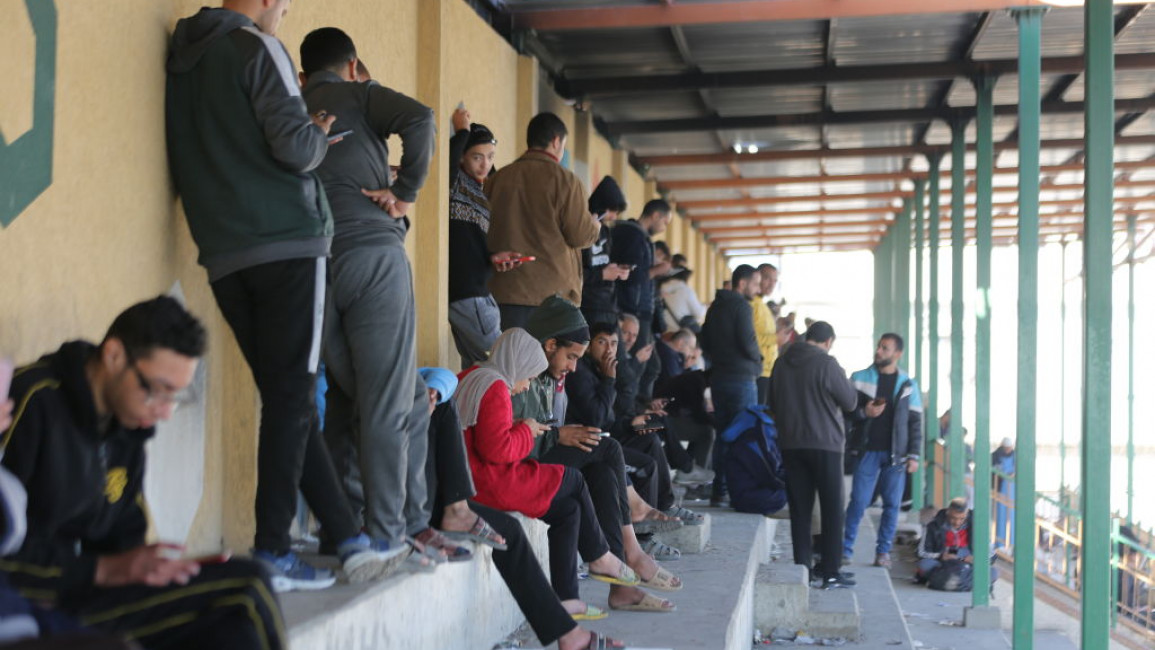Severed telecomm worsens suffering for Palestinians as Israel's war on Gaza deepens
Once again, the Israeli army deliberately cut off telecommunications in the besieged coastal enclave, compounding the suffering faced by Palestinians as Israel's military operations continued, currently focused at Khan Younis and the centre of the Gaza Strip.
In separate interviews with The New Arab, Palestinians in Gaza described how the lack of communication has significantly impacted their lives, forcing many of them to be in the dark in terms of how the war fares or have the ability to contact their loved ones, mainly of whom are sheltering in dangerous places.
Mohammed al-Gharabli, a 25-year-old father of two, was devastated to find out that his only brother was killed by the Israeli army six days ago. He had no chance to mourn his brother.
"The Israeli army insists on incurring more losses on us even when they order us to evacuate our houses. They cut off the communications to commit more crimes against us and our families who stayed behind in their homes," he remarked TNA, his eyes brimming with tears.
"We are in a race against everything in Gaza (…) against death, time and even against our hopes that we would survive someday," Gharabli added.
On Monday night, 22 January, the Palestinian Telecommunication Company declared that all the services of Jawwal and the internet had ceased in Gaza due to Israel's war.
It was the 10th time cut off communication in Gaza since Israel launched a war on the besieged enclave last October. The lack of communication isolated the Palestinians from the world and from their loved ones and has fragmented and hindered the work of health and defence crews operating on the ground.
"No one can imagine the state of anxiety and worry that we live in when the telecoms are cut off. We cannot call our families, which puts us under stress because we may hear bad news about them," Rawan al-Shawa said to TNA.
The 36-year-old mother of four recalled to TNA that she lost her mother two months ago when the army cut off the telecommunications and killed her family in the al-Zeitoun neighbourhood.
"It is too hard not to say goodbye to my mother. I still cannot imagine how she was buried, without seeing her or even kissing her," the grieving woman said to TNA.
All attempts of Abdul Hakim Awad, a Rafah-based Palestinian man, to call his father in Gaza City have failed.
"In regular days, my family struggled to obtain some internet and communication (…) we used to call them at the dawn. Now, we cannot reach them, and I am really worried about their situation," the 39-year-old father of six said to TNA.
Awad spends most of his time listening to the radio to get any information about the Israeli military operation in Gaza, praying that it would be far away from his family house.
"No one is in a safe place, but at least we hope to not lose any of our beloved people," he said.
"The continued interruption of telecommunications and internet services will cause disasters that threaten the lives of citizens," Ismail Thawabta, the head of the government media office in Gaza, told TNA.
"We recorded numerous disasters that threatened the Palestinians' lives because of the cutting off communications, mainly among those who were attacked by the army and did not have means of communications that would let them reach health crews in their areas," Thawabta said.
He held Israel "fully responsible for this ongoing crime against the residents of the Strip" and he called on countries to "intervene immediately to stop the war."
Thawabta also appealed to international organisations related to telecommunications and the internet to "pressure the occupation [Israel] to operate these services in the sector and put an end to this recurrent tragedy."


![President Pezeshkian has denounced Israel's attacks on Lebanon [Getty]](/sites/default/files/styles/image_684x385/public/2173482924.jpeg?h=a5f2f23a&itok=q3evVtko)



 Follow the Middle East's top stories in English at The New Arab on Google News
Follow the Middle East's top stories in English at The New Arab on Google News


